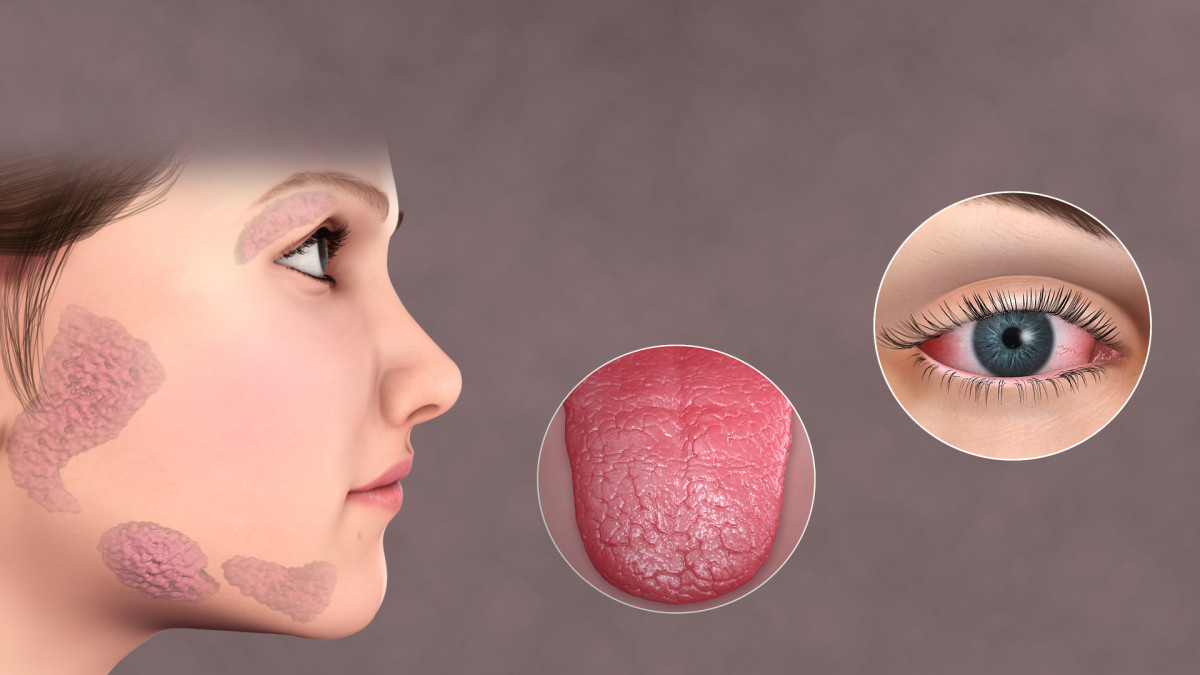How Much Vitamin D Do You Need In Your Diet?
VITAMIN D3 at 400 IU DOSAGE (Softgel)
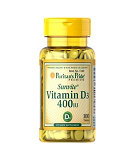
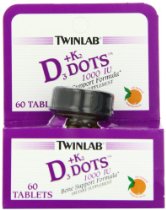
Especially If You Have Multiple Sclerosis, Lupus, Immune Diseases
We all need Vitamin D in our bodies for strong bones and immune systems.
But you can't just go popping Vitamin D because Anne DiGeorge said so. Just because I tell you how much I take daily does not mean it is the correct dosage for you because I am not you - we are all different. Like other things I talk about here, this is one of the biggies and it all begins with a blood test that you MUST ASK for because it is not done routinely.
If you have Multiple Sclerosis, EBV (Epstein Barr Virus), Mononucleosis, Fibromyalgia, Crohn's Disease, Sjogren's Disease, Rheumatoid Arthritis, Lupus or any autoimmune disease that compromises the immune system, INSIST on having this blood test included in your bloodwork, which should be several times per year.
Even if you don't have an autoimmune disease, and your doctor "suspects" you are deficient in Vitamin D, you must always have a particular blood test for Vitamin D levels done first, so that you have a baseline by which to measure; you do not want overdose on Vitamin D. (see chart below for toxicity levels).
In simple terms, if you’re vitamin D deficient, your immune system will not activate to do its job. And since vitamin D also balances your immune response, it prevents an overreaction in the form of inflammation, which can lead to autoimmune flares in Multiple Sclerosis, Lupus, Rheumatoid Arthritis and in Crohn’s disease.
Throughout this hub, I have featured photos of Vitamin D3 in many of forms so you can see the variety available. Although the photos are from one company (Puritan Pride) that I happen to use, please view them as examples and not advertising for that company.
Also, please bookmark this hub for future reference. There is a lot of information here and you may want to come back to it to review, verify, and/or comment.
Do You Take Vitamin D Supplements now?
Vitamin D3 in 1,000 IU Dosage (Softgel)

VITAMIN D3 - 2,000 IU DOSAGE (Softgel)

WHAT BLOOD TEST TO ASK FOR
Before you attempt to introduce any size dose of Vitamin D into your regimen, it is important to get your blood levels tested so you have a "baseline." This is the number that all future tests will be measured against to see if your are taking in adequate amounts of Vitamin D.
To start taking the vitamin without blood testing is silly; you will never know if it is doing good for you or, in some cases, doing harm to you. So the only way to know you are getting the correct dose is to have the blood test to start and then every three to six months after.
However, there are two different blood tests for Vitamin D:
1,25(OH)D, and 25(OH)D.
The correct test your doctor needs to order is 25(OH)D, also called 25-hydroxyvitamin D, which is the better marker of overall D status. This is the marker that is most strongly associated with overall health.
RESULTS AND INTERPRETATION
How do you, as a patient, know what the blood test results mean?
DO NOT take the following answer from your doctor -- "Your blood tests look good; all levels within normal range." You may as well throw your money away when you paid for the blood work because that answer is NO answer.
As the patient, it is your right to have a COPY of your blood test results - each and every time you get blood work. Keep a file of them in date order so you can see your progress or lack thereof.
As an informed patient, this is one of the ways you can take back control of your health program. An informed patient will often bring things to the doctor's attention because doctors don't investigate - they take the interpretations of lab values that the lab gives them.
Question your doctor - what does "this" mean? regarding tests or their results.
You'll be surprised at what the doctor "doesn't" know. Watch him closely as he gives you his answer. I never ask a question that I don't already know the answer to -- I research and do my homework before I ask my question so I know the value of what is being told to me.
YOU must be your own health care advocate.
A busy doctor will look at blood results and only look at the column that shows which tests are "out of range" but not look into what to do about it. I hope I can help you understand blood results better in this post. Feel free to comment with your questions.
Do Not Copy. Copying anyone's work is stealing!

LIQUID VITAMN D3 at 5,000 IU

VITAMIN D3 at 5,000IU Softgel

TEST RESULTS
While many labs have their own set of values and the ranges they consider to be "normal", the same is true for the many doctors out there too. The report that the lab sends to the doctor showing results can change from lab to lab. When you are going to be tested, stick with the same lab -if possible - so your results are consistent.
You must make sure the lab is performing the correct test ---- 25(OH)D, also called 25-hydroxyvitamin D, which is the better marker of overall D status .
If you get it done by Quest Labs in US, you’ll need to divide your result by 1.3 to get the number that actually correlates with all the chart below.
Next, the “normal” 25-hydroxyvitamin D lab range is between 20-56 ng/ml. As you can see in the chart below in the paragraph titled THE NUMBERS AND WHAT THEY MEAN, this conventional range is really a sign of deficiency, and is too broad to be ideal.
In fact, your vitamin D level should never be below 32 ng/ml, and any levels below 20 ng/ml are considered serious deficiency, increasing your risk of as many as 16 different cancers and autoimmune diseases like multiple sclerosis and rheumatoid arthritis, just to name a few. A lot of MS'ers who never took vitamin D have first blood work with alarmingly low vitamin D values.
The OPTIMAL value that you’re looking for is 55-65 ng/ml.This range applies for everyone; children, adolescents, adults and seniors.
Vitamin D status is measured by looking at blood levels of 25-hydroxyvitamin D3. There are three common methods used for measuring vitamin D3 but the one you want is:
LC-MS/MS – This test measures 25-hydroxyvitamin D2 and D3 separately
The LC-MS/MS (liquid chromotatography-mass spectrometry) method is the preferred method for many labs, including the Mayo Clinic, Esoterix, ZRT, and others. That doesn't mean you have to ask for this specifically, but this is just a FYI that there are a couple of methods of performing the test.
Whatever the method, be consistent and have the same one done each time so your better informed of your blood levels consistency without having to worry about what lab or what method was done.
Have you ever had your blood tested for Vitamin D levels?
Vitamin D Blood Test Values: The Numbers & What They Mean
Values
| Result
| Indication
|
|---|---|---|
Less than 50ng/ml
| Deficient
| |
50 to 65ng/ml
| Optimal
| |
65 to 90ng/ml Toxic
| Toxic
| cancer starts to occur around 80ng/ml
|
More than 100ng/ml
| Excessive
|
VITAMIN D3 at 10,000 IU Softgel




- How To Find GPS Coordinates, Longitude, Latitude, Altitude
Find latitude and longitude of any known location by clicking it on a map or entering zip codes or addresses. Convert decimal degrees to degrees minutes seconds and vice versa.
HOW MUCH VITAMIN D3 DO I NEED AND WHAT KIND?
A Pill or the Sun, which Vitamin D source is best?
Actually, you need BOTH.
Vitamin D3 is a fat soluble vitamin and can be quite toxic. Once you have vitamin D toxicity you can't easily turn it around, which is why I recommended getting your blood levels checked prior to taking oral (or injectable) vitamin D3 supplements.
Sunlight is the best source of Vitamin D - with NO sunscreen in 15 to 30 minute increments.
How much do you need?
Just until your skin starts to warm or turn slightly pink - no more than half an hour in direct sunlight WITHOUT sunscreen is the norm.
Avoid sunburn.
When you can't get adequate sunlight, supplementing with Vitamin D3 capsules is the next best choice. Tanning beds are another post entirely, for another time.
It can take 3-6 times longer for darker pigmented skin to reach the equilibrium concentration of skin pre-vitamin D. BUT, skin pigmentation does not affect the amount of vitamin D that can be obtained through sunshine exposure.
A common misconception is that occasional exposure of your face and hands to sunlight is "sufficient" for vitamin D nutrition. Indeed, this exposure can provide 200-400 IU vitamin D during those months when appropriate sunlight is available, but for most of us, this is an absolutely inadequate exposure to move vitamin levels to the healthy range.
Please also remember that just because it is sunny and hot outside, it is absolutely not an indication of the amount of UV-B present.
If your latitude is above 30 degrees north or below 30 degrees south, you will likely benefit from vitamin D3 supplementation from September to mid-April (if you do not live in Florida, California, Hawaii, Arizona and other "sunny" states.)
If you don't know the latitude of your city you can use the latitude finder link I have provided. Upon clicking it, the map of the USA comes up, but if you move your mouse over the map, other countries will come into view.
If your latitude is lower than 30 degrees, then you have access to good sunshine and may not need oral vitamin D3 supplementation. The only way to know is through the blood test I mentioned above.
While vitamin D3 has enormous potential for improving your health, it has significant potential to worsen it, if you use it improperly.
For safety purposes it is advisable to optimize your vitamin D3 levels only with the help of a trained health care professional.
The current Recommended Daily Allowance (RDA) of regular Vitamin D (not D3) is:
400 units for most infants and children,
200 units for people up to age 50,
400 units for age 51 to 70, and
600 units for seniors over age 71.
So if you are taking 1,000 units a day and think you are getting too much, chances are you are not getting enough since the RDA has not been changed from the thinking of the 1960s.
COD LIVER OIL 1000 MG

Vitamin D Supplements
There are two types of vitamin D supplements:
Vitamin D3 (cholecalciferol), which comes from fish oil, and
Plant source D2 (ergocalciferol), which is found in fortified foods and some supplements. D2, found in plants and made active by irradiation, is less biologically active.
Vitamin D3 is found in eggs, organ meats, animal fat, cod liver oil, and fish.
If you just can't stand to take Cod Liver Oil in its whole food state, you can try the supplement pictured at the right. It is the equivalent to the vitamin D3 formed on your skin from UV-B rays.
You should stay away from the synthetic D2 as it has been shown to be toxic at the higher dose ranges.
You will only want to use vitamin D3 (cholecalciferol).
If you have sarcoidosis, tuberculosis, or lymphoma, it would be best for you to avoid ALL oral vitamin D supplementation until tested.
It is highly recommended that you get the 1,25(OH)D test before you supplement with any sun exposure or oral vitamin D3 as it is a better indicator in people with this health challenge.
A good source of vitamin D3 is a whole food product - cod liver oil.
No, this is not the same one many remember as disgusting tasting. That cod liver oil usually tasted bad because it was rancid!! Processing of cod liver oil has improved considerably since those days.
RECOMMENDED DOSES
25 micrograms equals 1000 units of Vitamin D3
Ages 5 and under = 35 units per pound of weight per day
Ages 5 -10 = 2500 units per day
Ages 18 - 30 = 5000 units per day
Pregnant women = 5000 units per day
Vitamin D3 absorption decreases as we age, so older folks may benefit from this supplement too. Vitamin D3 supports neuromuscular, breast, colon and pancreas health.
WARNING
There is no way to know if the above recommendations are correct. The ONLY way to know if you are deficient is to test your blood FIRST. You MAY need 4 to 5 times the amount recommended above!
Some patients need as much as 50,000 units for three to six months to get regulated and even though it may seem toxic, as long as it is done under a doctor's CARE/MONITORING, and blood tested monthly, it has been an acceptable practice.
Ideally your blood level of 25 OH D should be 55 to 65ng/ml.
In addition to vitamin D3, cod liver oil also has an excellent supply of vitamin A and essential omega 3 fatty acids, DHA and EPA.
CALCIUM MAGNESIUM WITH VITAMIN D ADDED

Interactions with Medications
Vitamin D supplements have the potential to interact with several types of medications. A few examples are provided below. Individuals taking these medications on a regular basis should discuss vitamin D3 intakes with their healthcare providers.
STEROIDS
Corticosteroid medications such as prednisone, often prescribed to reduce inflammation, can reduce calcium absorption and impair all vitamin D metabolism. These effects can further contribute to the loss of bone and the development of osteoporosis associated with their long-term use.
WARNING
Steroids tend to induce leg and foot cramps. Supplementing with a slightly higher than normal dose of Vitamin D3, Calcium with Magnesium will take care of the cramps.
OTHER MEDICATIONS
Both the weight-loss drug orlistat (brand names Xenical® and alli™) and the cholesterol-lowering drug cholestyramine (brand names Questran®, LoCholest®, and Prevalite®) can reduce the absorption of vitamin D3 and other fat-soluble vitamins.
Both phenobarbital and phenytoin (brand name Dilantin®), used to prevent and control epileptic seizures, increase the hepatic (liver) metabolism of vitamin D to inactive compounds and reduce calcium absorption.
WARNING
Antibiotics tend to leach the bones of calcium and Vitamin D. A slightly higher than normal dose of Vitamin D3 and Calcium with Magnesium will help relieve the foot and leg cramps.
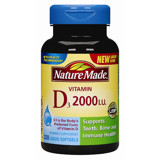
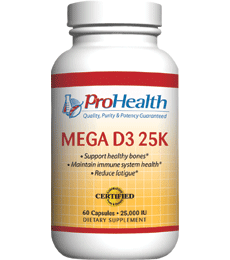
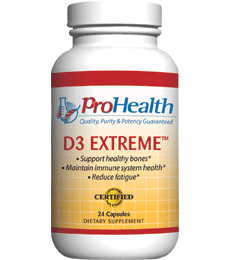
WHAT MOST PROFESSIONALS WILL NOT TELL YOU
VITAMIN D3 ALONE IS NOT ENOUGH
Vitamin D3 needs other factors in order to utilize and metabolize the vitamin properly.
They are magnesium, zinc, Vitamin K2, boron, and Vitamin A.
Magnesium is the most important of them all because as Vitamin D levels rise, it can show any underlying magnesium deficiency. So if someone is having problems supplementing with any of the D vitamins (example: not getting good blood test results after being on Vitamin D3 for six months or so), then magnesium deficiency could be the reason why.
For that reason, magnesium should ALWAYS be part of your blood panel.
If you are taking a Calcium/Magnesium supplement, it usually has Vitamin D (400 units) added to it. Read the label. Manufacturers know that Calcium and Magnesium needs Vitamin D for the body to assimilate it.
You need CALCIUM for bone strength.
You need MAGNESIUM for bone health and structure.
WHAT KIND OF VITAMIN D3 SUPPLEMENT SHOULD I BUY?
By now, if you viewed the photographs in this article, you will know that Vitamin D3 comes in many different forms. But Brand Name is not the most important thing when choosing a Vitamin D product.....the list of ingredients is.
Even though I have featured Puritan Pride products here, you can get the same potency product almost anywhere. They just happened to have great photographs to show you what I am talking about! ::smile::
You need to shop around and read your labels.
A cheaper bottle is not a bargain if you have to take two or more capsules to get the same amount that is in one capsule of a higher priced product.
You want to make sure there are not a lot of additives you can't pronounce on the label.
I do order from Puritan Pride, but that is my preference because they offer quality products, money back guarantee, and I can buy 2 and get 3 free, which is a great value for me.
I get 5 bottles of 200 capsules for the price of 2 bottles. I have also bought at the warehouse stores at considerable savings.
Basically, you are looking for Vitamin D3 capsules in 2,000 to 5,000 unit bottles. If it just says Vitamin D, you will have to read the label to see what type of Vitamin D. Very important.
My bottle says Vitamin D on front label, but in list of ingredients it says vitamin D3, 2000 units - so be careful what you pick up.
I personally do not need 5,000 units per day (*per my blood work) so every other day I take 4,000 IU (2 capsules of 2,000IU) and every in between day I take 6,000IU (3 capsules of 2,000IU) so that I am within the 5,000 unit range. You may need more or less than I do.
I could have bought 5,000 unit capsules and took 5,000 every other day, but I have better control in the smaller doses. Where I do not need 5,000 per day, you may, in which case purchasing Vitamin D3 in bottles of 5,000 would benefit you more than it does me.
If you take Calcium Magnesium, it should have "vitamin D added" written on the label and it is always 400 units.
Check your label to see how many tablets equal the amount they specify in ingredients.
A bottle may say 1,000 mg Calcium, 500 mg Magnesium and 400 units Vitamin D, but the serving SIZE is 3 tablets. That means you have to take 3 tablets to get the amount they state on label.
So read your labels.
Get your blood test.
After being on Vitamin D3 therapy for 30 days, get blood tested again to make sure the dosage is effective for you.
After 30 days, get blood tested again at 60 days for toxicity. By then, you should have a good idea of what dosage is enough for a maintenance dose for you to continue taking onward.
This is not a vitamin you take until you get to the right levels, and then stop taking it.
Most people will have to continue taking Vitamin D3 for the rest of their lives.
Once you stop taking it, your blood levels will eventually drop and you will have to start all over again. So be smart and stay on it.
One cannot get enough Vitamin D3 strictly from food and the sun alone in the world the way it is now with the processing of our food, and the risk of skin cancer from the sun.
Another long post, I know, but please leave me your questions and comments. Thanks for reading.
© Copyright Anne DiGeorge 2009, 2010, 2011, 2012, 2013, 2014
6/3/2014 - Updated by Rachael O'Halloran for awordlover
Do not copy this article. It is not free to take just because it is on the internet.

Just in case ...
June 3, 2014 - If you happen to see this article published somewhere else on the internet, it means it was stolen. Again.
Please leave a comment on this hub what website you found it on and include a valid link. This and all articles are copyright by awordlover.
Help keep your work safe by putting your name not only at the end of your article, but weave it into the paragraphs by speaking as yourself.
You will understand how awordlover did it by reading this article and her other hubs.
Thank you, Rachael O'Halloran, moderator for awordlover's hubs.
© 2010 awordlover





